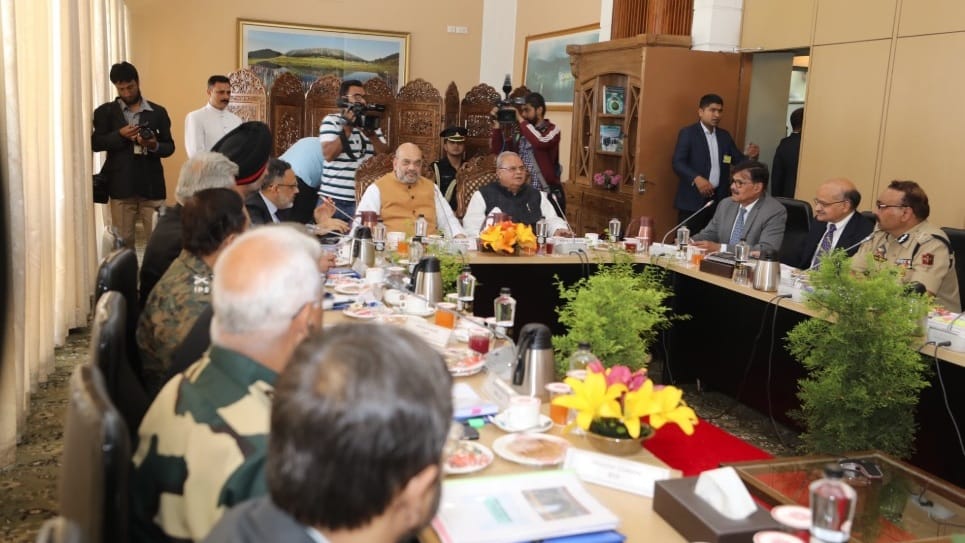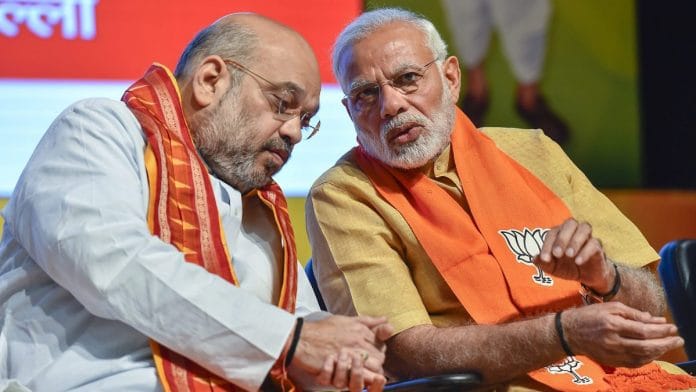Terror and talks cannot go together’ as far as Pakistan is concerned; no talks with stakeholders in Jammu and Kashmir unless they agree to adhere to India’s Constitution; failed coalition experiment with the PDP; and the appointment of an interlocutor. This is what dominated Prime Minister Narendra Modi’s first term. Five years went by. A ‘hard’ strategy focused primarily on eliminating terrorists without political engagement bore no fruits.
Media speculated that home minister Amit Shah will continue the policy.
But suddenly something seems to be changing in Modi government’s second term. A fundamental shift in his Kashmir approach is afoot. After the failed ‘hard’ policy, the government seems to have reverted to ‘iron fist in a velvet glove’ policy.
Satya Pal Malik, the governor of J&K, sprang a surprise on 22 June when he announced in the presence of two Union ministers. “Things are much better than when I came here. Look at the Hurriyat. Ram Vilas Paswan stood at their door and they didn’t open the door. Now they are ready for talks.” The next day, Hurriyat Conference chairman, Mirwaiz Umar Farooq, said that if “meaningful” talks are initiated, “there will be a positive response.”
On 24 June, the Jammu BJP leadership gave a hasty statement that any talks with the Joint Resistance Leadership or Hurriyat at this stage without them publicly accepting the “pre-conditions” – loyalty to the Constitution and accepting Jammu and Kashmir to be an indisputable part of India – will be “counter-productive and a retrograde step”.

Also read: 20 years after Battle of Tololing, defence reforms & Kashmir policy are Modi’s key challenges
However, BJP vice president and party’s J&K in-charge Avinash Rai Khanna adopted a more conciliatory tone. He said that although there is no formal offer from the Centre, “what I’m saying, is an offer.” “Develop faith in the country’s Constitution and assist in maintaining the law and order situation, then we can talk.”
So, what are the reasons for this change?
‘Hard’ policy has run its course
Despite empirical wisdom that insurgencies require a political solution, new governments believe a tough, concerted effort can eliminate insurgents and terrorists, and solve the problem. However, the Indian Army has always carried out people-friendly operations to create scenarios for political solutions. But governments have failed to seize the opportunities. Levels of violence increased after 2015 due to lack of political engagement, failed coalition experiment of the BJP-PDP, and people’s frustration manifesting in the Burhan Wani unrest.
The Indian Army did briefly deviate from its people-friendly approach by blurring the distinction between protesters on the streets or at encounter sites, and the terrorists. This was a fundamental error and a course correction has since been done. Protests are better managed now and are on the wane. Terrorists always have the initiator’s advantage. However, Uri and Pulwama terror attacks notwithstanding, violence in Kashmir is within manageable limits and nowhere near the peak period of pre-2003.
Also read: P.V. Narasimha Rao’s Kashmir policy was much more muscular than PM Modi’s
Pakistan under pressure
India’s changed security strategy – 2016 surgical strikes and 2019 Balakot aerial strikes – a poor economy, pressure from the Financial Action Task Force (FATF), and international isolation have forced Pakistan to carry out a strategic review. It has no option but to ‘rein in’ the terrorist organisations operating in J&K.
Pakistan has opted for a ‘tactical pause’ in J&K, and is keen to engage with India to end its international isolation and to tide over its economic problems. This, in turn, has exposed its limitations before the Hurriyat and the people of J&K.
Resignation to reconciliation
Years of violence producing no tangible results have forced a feeling of resignation on the people of J&K and the Hurriyat leadership. They have realised that a strong India will not compromise with its sovereignty. The threat of losing even the special status accorded in Constitution under Articles 370 and 35A looms large.
Hurriyat, which has acquired an advantage with the Valley’s dominant political parties becoming relatively weak, knows an influx of radical Islam will make it irrelevant. And so, it too has reconciled and decided to make an attempt to seek a solution within the constitutional framework by maintaining maximum autonomy.
Prognosis
It is my assessment that backroom parleys have been going on between the Hurriyat, the political parties, other Kashmiri stakeholders, the interlocutor, the governor and special political representatives of Prime Minister Narendra Modi.
The stage is set for politics to take the centre stage in J&K. Elections may be held in the near future to also allow elected representatives to participate in the talks. Home minister Amit Shah’s two-day visit may further indicate what form the political initiative will take.
Also read: Amit Shah’s Kashmir trip is about Amarnath Yatra. PDP & NC hope for major announcement
Of course, question marks over Pakistan and Hurriyat’s intent will remain. Is Pakistan merely playing for the time with its ‘tactical pause’ and there should be no hope of any change in its long-term strategy? Is Hurriyat part of this design? It remains unclear but despite these imponderables, the Modi government has decided to test the waters. It is also likely to engage with Pakistan – but unlikely to discuss the Kashmir issue.
It would be prudent for Prime Minister Modi to take the opposition into confidence and take it along. The government must also deliver a clear statement of intent to ensure that the jingoist media and the public sentiments riding high on neo-nationalism do not derail the process. The talks with the Hurriyat are likely to be held outside the public glare, just like the Naga peace talks. Early elections in J&K are likely to facilitate the political process.
I cannot resist the temptation to end this article by how I had concluded my column in ThePrint on 6 December last year:
“It is my assessment that by summer of 2019 the stage would be set for politics to once again take centre stage. Hopefully by then, both the Centre and the state will have new governments. I hope the politicians, media and the public rise to the occasion and we collectively do not fail our nation, and the people of Jammu and Kashmir.”
Lt Gen H S Panag PVSM, AVSM (R) served in the Indian Army for 40 years. He was GOC in C Northern Command and Central Command. Post retirement, he was Member of Armed Forces Tribunal. Views are personal.







All these developments mean that the BJP is coming back to the MMS line and policies , as was the case with GST, Aadhar, MNREGA, FSA etc. Of course no BJP leader will openly accept that.
The author of the article says.
“The army has always carried out people-friendly operations to create scenarios for political solutions.”
However,
A 2010 US state department report stated that the Indian army in Jammu and Kashmir had carried out extrajudicial killings of civilians and suspected insurgents.
But there were other unfriendly operations by the Army, the official figures from Indian government sources state 3,642 civilians were killed by security forces up to 2010.
The international committee of the Red Cross in a briefing paper to the US state department said the Indian Army “assaulted civilians during search operations, tortured and summarily executed detainees in custody and murdered civilians in reprisal attacks”
Some of these documented killings, can be construed as war crimes.
To explain all this Gen Panag writes the following.
“The Indian Army did briefly deviate from its people-friendly approach by blurring the distinction between protesters on the streets or at encounter sites, and the terrorists. This was a fundamental error and a course correction has since been done. ”
The General will bring his legal brain to recall – all orders to commit genocide or crimes against humanity are manifestly unlawful, there is no defence.
An order,may come from a superior at the level of national law. But according to Nuremberg Principle IV, such an order is sometimes “unlawful” according to international law.
Were some of the type of crimes that happened in the Kashmir valley, crimes against humanity?
There are those on the ground who have documented crimes by security forces in the valley over the years, a few of these it is claimed, present a strong case of being crimes against humanity as defined by the Rome Statute of the International Criminal Court.
But my dear General Panag, Alea iacta est !
Hurriyat is irrelevant, the insurgency has moved on to the cult of martyrdom. Hurriyat follows where the youth lead.
70% of Kashmir is youth, General go talk to them, they are the ones who are relevant.
But sadly in the valley things have moved on. It has been some time since you were GOC N Command, you were always one of the enlightened few – In command and after retirement you spoke your mind – I recall how you voiced a strong opinion when a fellow inhabitants of the valley was tied to the jeep and used as a human shield.
Our Young here are being increasingly motivated by religion and have ceased to fear death. More and more of the intelligentsia are joining the ranks of the insurgency which changes shape.
There is a acute shortage of arms and skills for bomb making, but we cannot expect this to continue for long.
Dissent gets better organised and resourced by the day. While the army is effective in killing the insurgent, then insurgent will eventually get better, deploys into cells, eliminates the informer, gets more experienced…… easy success will accordingly get increasingly difficult for the security forces.
The probability is this insurgency will reach the `Indian mainland where 170 million Muslims are increasingly alienated.
The sore that has festered for so long on the body of India has turned into gangrene, this along with water shortages, tanking economy, mass youth unemployment, the rise of fascist forces and the myriad of other problems, foretell dark days ahead for our beloved country.
We are sleep walking into a nightmare, it is for leaders like yourself to tell us how it is, to emulate that lady MP from W Bengal who stood up in the Lok Sabah and give a strong talk identifying this monster amongst us so clearly.
1000s of Terrorists killed is great news. There is no reason to talk to these Terrorists. More we kill the better. Not sure what Panag sahab is smoking.